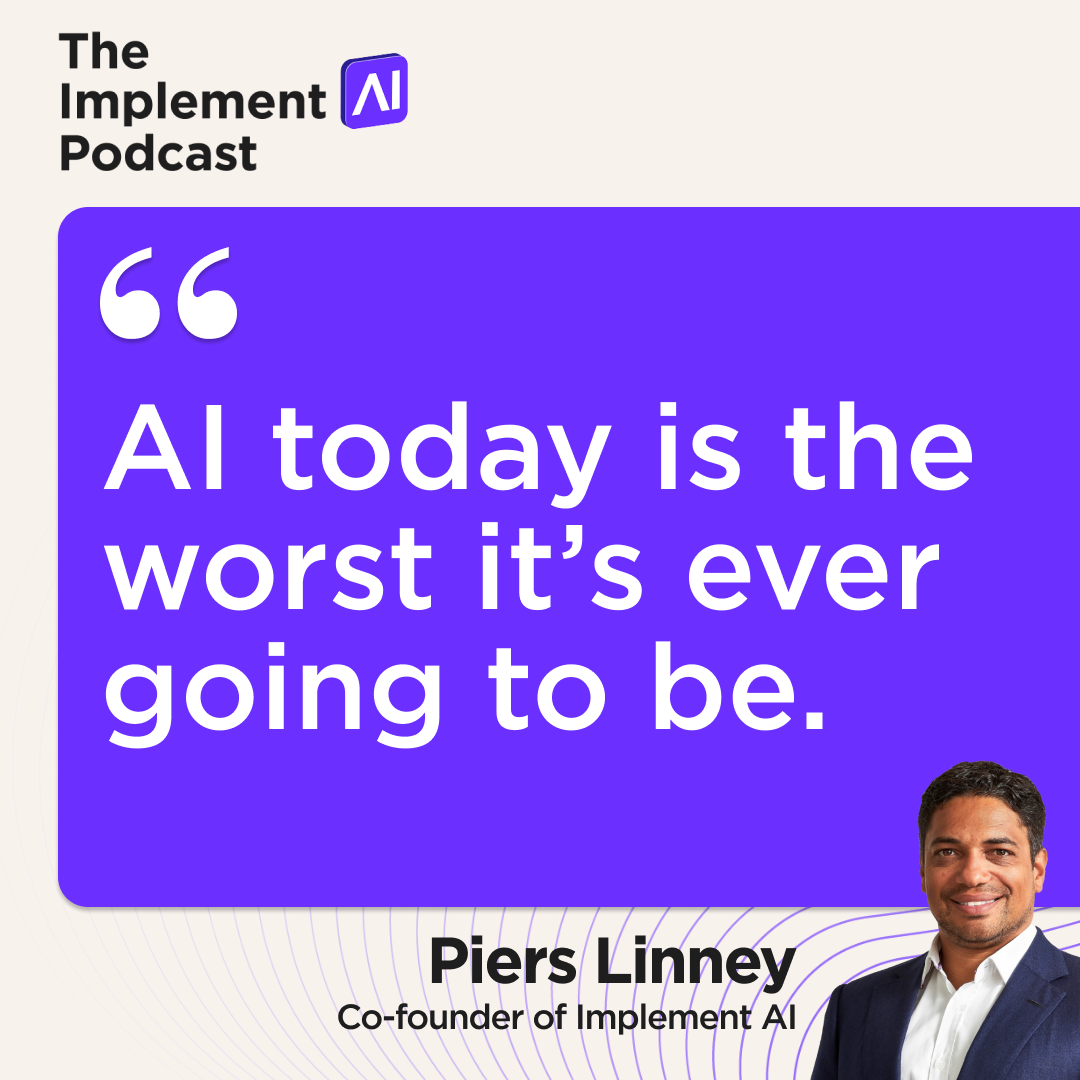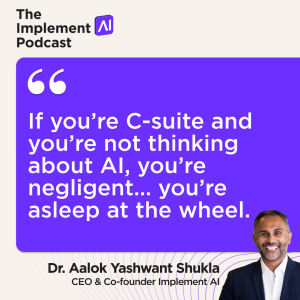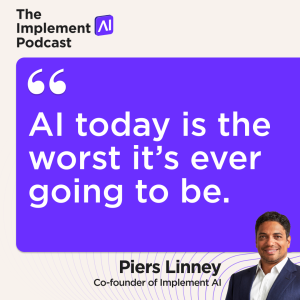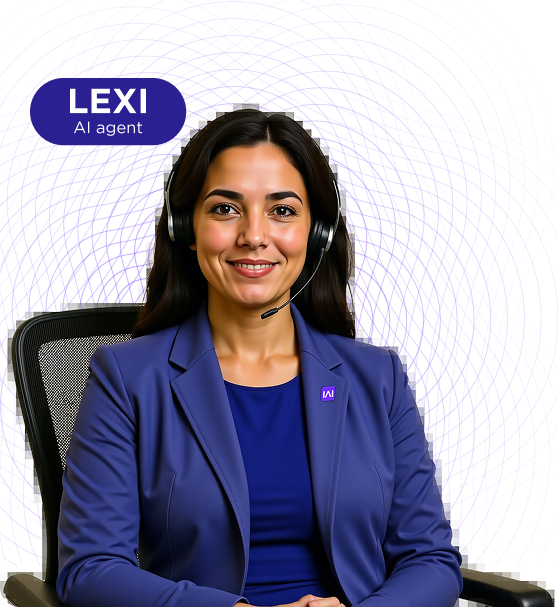The Implement AI Podcast #69 – From Istanbul to San Francisco: Why AI-First Businesses Will Be Impossible to Catch
November 18, 2025
Across finance forums, founder workshops, and tech conferences, a new pattern is emerging.
Leaders are no longer asking if AI will reshape their industries. They are asking how fast it will happen and whether they can keep up.
In this new episode of The Implement AI Podcast, Piers Linney and Dr Aalok Y. Shukla share lessons from Istanbul, Birmingham, and San Francisco, revealing what they call the real state of AI adoption.
From CFOs and founders to innovators and investors, one truth cuts through every conversation:
Businesses that move early, plan intelligently, and work AI-first will set a standard that others can never quite reach.
Part One: Events and Feedback
- The Finance Forum – CFOs Are Now in the Game
At the Finance Forum, Piers met leaders who once viewed AI as an interesting side topic. This time, their questions were sharper, centred on labour cost, compliance, and the economics of automation.
CFOs now see AI as a lever to protect margins, control risk, and open new capacity without stretching headcount.
Dr Aalok described it perfectly:
“There’s gonna be a profound implication, which is gonna change and address your cost structure, your competitive position, your opportunities, your future ability to transact and raise capital. You have to have thought about all this and at least have a plan.”
What’s driving CFOs to act:
- Rising pressure to optimise labour cost and efficiency
- Need for real-time data and predictive financial insights
- Strategic alignment between automation and compliance
- The search for sustainable productivity beyond headcount growth
The discussion made one thing clear: ignoring AI is not neutrality. It is organisational negligence.
- GBCC – Cross-Sector Demand Is Accelerating
The Greater Birmingham Chamber of Commerce brought together leaders from manufacturing, law, logistics, retail, and professional services.
Every industry shared the same concern: operational bottlenecks, data silos, and customer expectations that evolve faster than teams can respond.
Key lessons from the GBCC session:
- AI value exists in every sector, from legal document automation to supply chain monitoring.
- SMEs can start with narrow use cases and scale through evidence, not theory.
- Revenue, capacity, and experience remain the three anchors of measurable ROI.
Across sectors, leaders began to recognise that the competitive edge will belong to those who implement rather than observe.
- Festival of Entrepreneurs – Founders Building AI-First from Day One
The Festival of Entrepreneurs highlighted a new generation of founders who see AI not as a department but as a foundation.
Workshops led by Aalok focused on spotting opportunities across three dimensions:
- Revenue – finding new income streams through instant response and personalisation
- Capacity – freeing human teams from repetitive, low-value work
- Experience – creating context-aware customer journeys that build loyalty
These discussions showed that AI is not just a growth tool but the new infrastructure for modern companies.
Part Two: The State of AI
- Istanbul – Inside the Making of AIOS v2
In Istanbul, the Implement AI team refined the next evolution of AIOS, the AI Operating System.
The goal: transform agents from reactive tools into adaptive, learning colleagues.
Aalok described it this way:
“The way I would look at the AIOS is like it was like a step forward in being able to, like, almost move from some kind of tool or copilot to a kind of colleague, essentially, or a digital worker.”
What defines AIOS v2:
- Learning loops that measure outcomes and improve with use
- Objective-driven architecture, not just task automation
- Built-in human oversight for transparency and compliance
- Integration across systems to create a truly connected digital workforce
The result is a workforce that grows more capable each week, not through replacement, but through augmentation.
- San Francisco – The Reality Behind the Hype
At a major voice-AI conference in San Francisco, Aalok found an ecosystem full of ambition but lacking in implementation.
Everyone was talking about the future; very few could show it in practice.
Key insights from the US market:
- Infrastructure is strong, but execution remains the gap.
- Voice AI is evolving rapidly, yet “work-doing” agents are still rare.
- True opportunity lies in building systems that deliver measurable results today.
For those ready to execute, this moment represents open ground, fertile, wide, and waiting.
- Human-in-the-Loop – Turning AI into Real Work
Aalok shared a simple yet powerful story.
An AI agent handles a live customer call, but pauses at a point requiring approval. Within seconds, a manager reviews, approves, and the agent resumes the call seamlessly.
That is human-in-the-loop design at work, not replacing people, but enhancing them.
What this unlocks:
- Faster decisions without compromising oversight
- Smarter escalation systems that save deals in real time
- Teams that collaborate with digital colleagues as part of the workflow
This balance between autonomy and accountability is what turns technology into transformation.
- Robots and Data – The Next Business Frontier
Piers Linney connected robotics with a larger business shift – the rise of data-rich mobility.
“You’ve got to think about these units that are now navigating our built environment, and they’re covered in sensors… The vision, LIDAR, radar, audio, you name it. And those sensors are collecting information. And the question then is, what do you do with it? These are data streams that never existed before.”
The opportunity ahead:
- Robots as mobile data systems rather than mechanical assets
- New datasets for mapping, logistics, and predictive maintenance
- Business models built on insight rather than output
The physical world is becoming a live data layer. The companies that harness it will redefine efficiency.
- OpenAI and the Expanding Ecosystem
The episode closes with reflection on OpenAI’s new features, including Sora 2 and the agent store.
For Piers and Aalok, these developments confirm a long-expected shift: Tools are no longer the focus, coordination is.
Key takeaways:
- CRMs and ERPs will soon operate as living systems powered by digital workers.
- Integration, not isolation, defines the future of productivity.
- Implementation skill is now the single greatest business differentiator.
As Aalok put it:
“The biggest barrier is basically not the technology. The biggest barrier is the people that can implement it.”
The AI-First Advantage
Piers summed up the urgency in one sentence:
“If you’ve got a business, you’ve got to start working towards AI-first. Because they’re the ones that are gonna be the optimal businesses, and the ones that are gonna be very, very hard to compete with. Start small, but really do think big. And by think big, we mean AI-first.”
What AI-first means in practice:
- Building workflows that learn, not just run
- Integrating human oversight from the start
- Embedding AI as infrastructure rather than add-on
- Creating capacity and insight that competitors cannot match
This is not about chasing trends. It is about building future resilience.
Final Thoughts
Episode 69 is more than an update from the field, it is a snapshot of how AI is embedding itself into the real economy.
Four truths stand out:
- Finance leaders are now leading the adoption wave.
- Implementation capability matters more than knowledge.
- Human-in-the-loop design turns AI from theory to outcome.
- AI-first businesses will dominate the next decade of competition.
The future is already here. The difference lies in who acts while others debate.
🎧 Listen to the full episode now:
Apple: https://bit.ly/47z74fU
Spotify: https://bit.ly/4qmhI0U
YouTube: https://bit.ly/470FEPY






